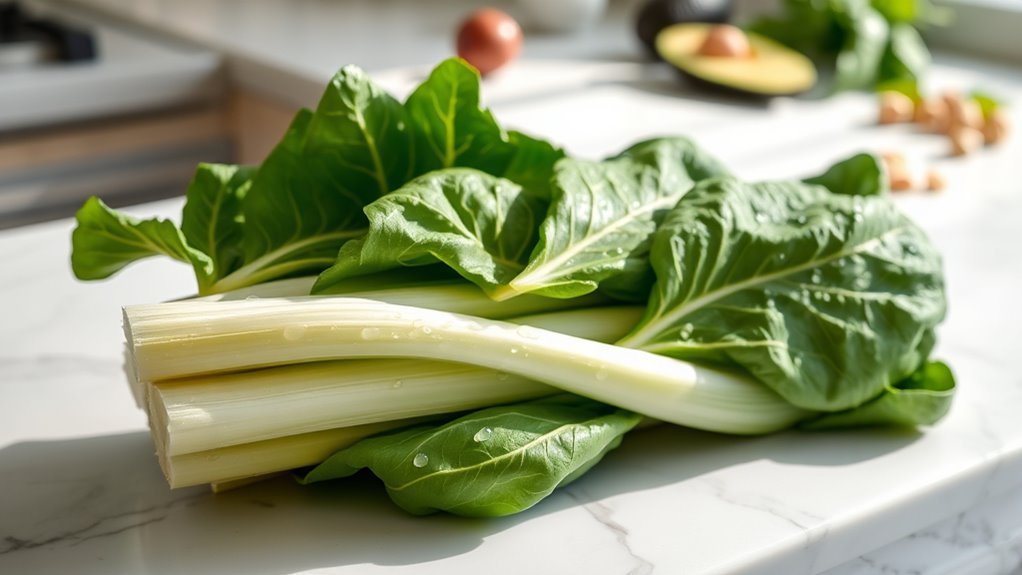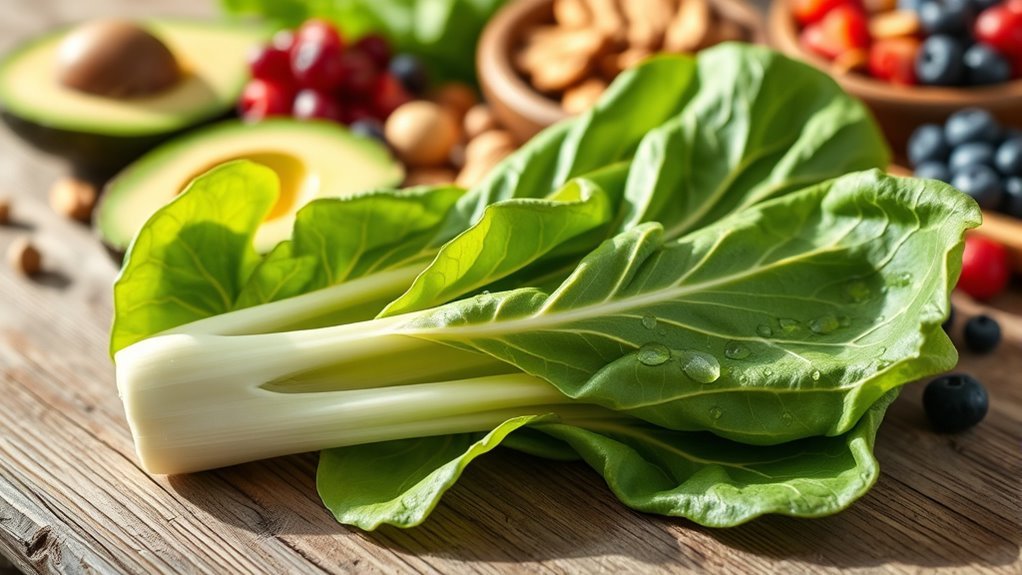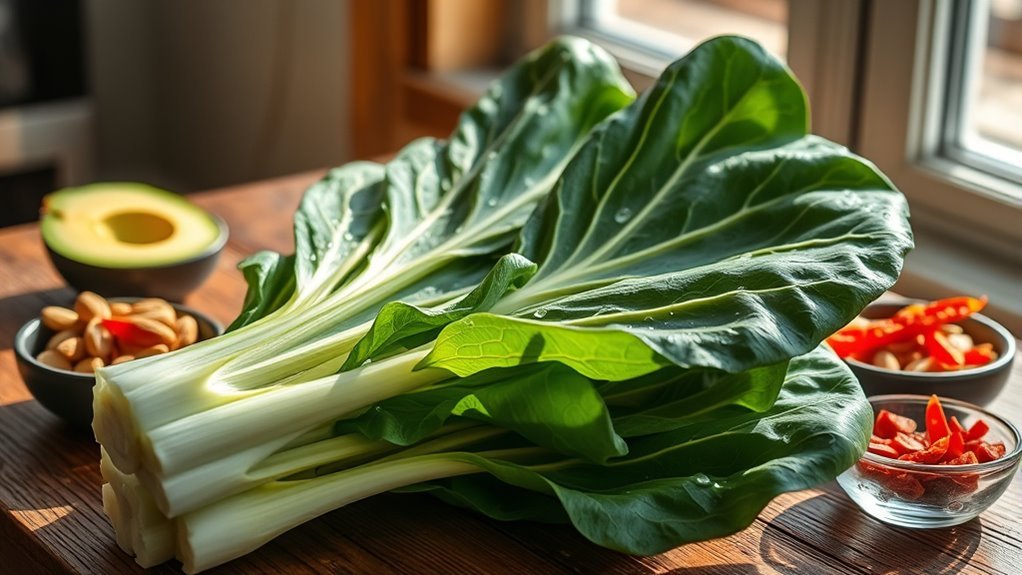Yes, bok choy is keto-friendly! With about 1 gram of net carbs per cup, it’s a low-carb vegetable that’s high in vitamins A, C, and K. This makes it a great addition to a keto diet, supporting your nutritional needs without derailing your carb intake. You can enjoy it raw, steamed, or stir-fried, offering versatility in your meals. Curious about how to incorporate it into your meal plan? There’s more to discover!
Nutritional Profile of Bok Choy

Bok choy, a leafy green vegetable, is not only versatile but also packs a nutritional punch. This cruciferous vegetable is low in calories yet rich in vitamins A, C, and K, making it an excellent choice for anyone seeking a healthy diet. You’ll find multiple bok choy varieties, such as baby bok choy and Shanghai bok choy, each offering unique flavors and textures. When it comes to bok choy storage, keep it in the refrigerator to maintain freshness, ideally in a perforated plastic bag to allow airflow. Its nutritional benefits, combined with its adaptability in various dishes, allow you to enjoy this leafy green while supporting your dietary goals, including those aligned with a keto-friendly lifestyle. Additionally, bok choy is low in carbohydrates, making it a great option for those on a low carb diet.
Carb Content in Bok Choy

While exploring low-carb vegetables for a keto-friendly diet, you’ll find that bok choy stands out due to its remarkably low carbohydrate content. With only about 1.5 grams of net carbs per 100 grams, it’s an excellent choice among carb sources. Plus, its fiber content adds to the benefits, helping to keep you full without compromising your carb limits. Incorporating low-carb leafy greens like bok choy into your meals can significantly enhance your nutrient intake.
Here’s a quick look at the carb content and fiber in bok choy:
| Nutrient | Amount (per 100g) |
|---|---|
| Total Carbs | 2.2 g |
| Net Carbs | 1.5 g |
| Fiber | 1.0 g |
| Sugars | 1.0 g |
| Protein | 1.5 g |
This makes bok choy a flavorful addition to your keto meals!
Health Benefits of Bok Choy

Incorporating bok choy into your diet not only helps you stay within your carb limits but also offers a variety of health benefits. This leafy green is packed with vitamins A, C, and K, which are essential for maintaining overall health. These nutrients support your immune system, helping your body fend off illness. Bok choy is also rich in antioxidants, which combat oxidative stress and reduce inflammation. Additionally, its high fiber content promotes digestive health, keeping your gut balanced and functioning well. With its low calorie count, bok choy is an excellent choice for those looking to manage their weight while enjoying nutrient-dense foods. Embracing bok choy can empower you to nourish your body effectively and healthily.
How Bok Choy Fits Into a Keto Diet
When considering how bok choy fits into a keto diet, it is crucial to look at its nutritional profile and carb count. This leafy green is low in carbohydrates, making it a great option for maintaining ketosis. Plus, you can easily incorporate bok choy into various meals with creative recipes that align with your dietary goals. Additionally, bok choy is a member of the leafy greens family, which are known for being low in carbs and high in essential nutrients.
Nutritional Profile Overview
Bok choy, a leafy green vegetable, boasts a low carbohydrate content that makes it an excellent choice for those following a ketogenic diet. With its high water content and minimal calories, it’s a nutrient-dense option that can help you feel full without compromising your carb limits. The nutritional benefits of bok choy include essential vitamins like A, C, and K, along with essential minerals such as calcium and potassium. These nutrients support bone health and immune function, making bok choy not just keto-friendly, but also a powerful addition to your overall diet. Incorporating this versatile vegetable into your meals can help you stay on track with your keto goals while enjoying a variety of flavors and textures. Additionally, the metabolic state of ketosis enhances the body’s efficiency in utilizing fat, further supporting your dietary objectives.
Carb Count Analysis
With its impressive nutritional profile, bok choy’s low carbohydrate content makes it a standout vegetable for those adhering to a keto diet. Typically, one cup of raw bok choy contains about 1 gram of net carbs, allowing you to enjoy it without worrying about exceeding your carb limit. Various bok choy varieties, like baby bok choy and Shanghai bok choy, also offer similar low-carb benefits. When incorporating this vegetable into your meals, consider different cooking techniques—stir-frying, steaming, or sautéing enhance its flavors while preserving its nutritional integrity. This versatility allows you to enjoy bok choy in a range of dishes, making it a freedom-loving choice for anyone seeking to maintain a keto lifestyle. Additionally, bok choy is packed with essential vitamins, which further supports overall health and well-being.
Meal Ideas and Recipes
If you’re looking to incorporate bok choy into your keto meal plan, you’ll find that its mild flavor and crunchy texture make it an excellent addition to a variety of dishes. One popular option is bok choy stir fry, where you can sauté it with your choice of protein and low-carb veggies, creating a quick and satisfying meal. Alternatively, try a rejuvenating bok choy salad, combining chopped bok choy with avocado, nuts, and a tangy dressing for a nutrient-packed side dish. These options not only keep your carb intake low but also provide essential vitamins and minerals. With bok choy, you can enjoy delicious meals that align with your keto lifestyle while exploring your culinary creativity. Additionally, bok choy is low in carbs and complements other keto-friendly ingredients beautifully.
Cooking Methods for Bok Choy
While exploring the various cooking methods for bok choy, you’ll find that its versatility makes it a fantastic addition to a keto-friendly diet. Two popular methods are stir frying and steaming. Stir frying bok choy allows you to quickly cook it while retaining its crunch and nutrients. Just toss it in a hot pan with some oil and your favorite seasonings for a flavorful side dish. Alternatively, steaming bok choy preserves its natural sweetness and vibrant color, making it a healthy option. Steaming requires less oil, keeping it lower in calories, which aligns well with keto principles. Both methods are simple, quick, and can enhance your meals without compromising your dietary goals. Experiment with these techniques to discover your favorite!
Delicious Bok Choy Recipes for Keto
Bok choy’s versatility not only shines in various cooking methods but also opens the door to a range of delicious recipes that fit perfectly into a keto lifestyle. One fantastic option is a bok choy stir fry, where you can sauté it with your favorite low-carb veggies and protein, adding soy sauce or coconut aminos for flavor. Another delightful choice is a crisp bok choy salad, featuring fresh bok choy, avocado, and a tangy sesame dressing. Both recipes offer a nutritious way to enjoy bok choy while keeping your carb count low. With these dishes, you can savor the natural crunch of bok choy while maintaining your keto goals, allowing you the freedom to explore new flavors.
Comparing Bok Choy to Other Low-Carb Vegetables
When considering bok choy in your keto diet, it’s important to compare its nutritional profile with other low-carb vegetables. You’ll want to look at carbohydrate content and how versatile each option is in your meals. This assessment can help you make informed choices that align with your dietary goals. Additionally, incorporating low-calorie options like bok choy can enhance your nutrient intake while keeping carbohydrate levels in check.
Nutritional Profile Comparison
Although many vegetables fit well into a keto diet, comparing the nutritional profile of bok choy with other low-carb options can help you make informed choices. Bok choy varieties, such as baby bok choy and Shanghai bok choy, offer unique flavor profiles and nutritional benefits. For instance, while bok choy is low in calories and packed with vitamins A, C, and K, other low-carb vegetables like spinach or zucchini also provide essential nutrients. Spinach boasts higher iron content, while zucchini adds fiber. Each vegetable has its strengths, so consider your dietary goals and preferences. By understanding these differences, you can diversify your meals while staying aligned with your keto lifestyle, ensuring you enjoy the freedom to choose delicious, healthful options.
Carbohydrate Content Analysis
While considering low-carb vegetables for your keto diet, it’s essential to analyze the carbohydrate content of bok choy in comparison to other options. Bok choy contains about 1.5 grams of net carbs per 100 grams, making it an excellent choice within keto guidelines. For reference, spinach has roughly 1 gram of net carbs, while cauliflower sits around 3 grams. Both bok choy and spinach are lower in carbs than other common vegetable carbohydrate sources like carrots and potatoes. This means you can enjoy bok choy without worrying about exceeding your carb limits, allowing for greater dietary freedom. By incorporating a variety of low-carb options, you can maintain a balanced and enjoyable keto lifestyle while staying within your carbohydrate requirements. Additionally, incorporating whole, nutrient-dense foods into your meals ensures you receive essential nutrients while adhering to keto principles.
Culinary Versatility Assessment
How does bok choy stack up against other low-carb vegetables regarding culinary versatility? This leafy green is a powerhouse in the kitchen, offering a unique combination of bok choy textures and flavors that can elevate any dish. Here’s how it compares:
- Stir-fries: Bok choy holds up well, adding a delightful crunch.
- Soups: Its mild flavor enhances broth without overwhelming it.
- Salads: You can enjoy bok choy raw, lending a fresh, crisp element.
- Steaming: Retains its nutrients and offers a tender bite.
- Grilling: Charred bok choy brings out a smoky sweetness.
Compared to other low-carb veggies, bok choy’s adaptability makes it a fantastic choice for diverse culinary creations. Enjoy the freedom to experiment!
Portion Sizes and Serving Suggestions
When it comes to incorporating bok choy into your keto diet, understanding portion sizes is essential for balancing your macros. A typical serving size is about one cup of chopped bok choy, which contains roughly 1 gram of net carbs, making it a great choice for keto enthusiasts. You can enjoy it raw in salads or sautéed with your favorite low-carb proteins. For a delicious side dish, try steaming bok choy with garlic and olive oil. Remember, while it’s low in carbs, moderation is key. Pairing bok choy with healthy fats like avocado or nuts can enhance your meal’s flavor and nutritious value. Experiment with different serving suggestions to find what fits best in your keto lifestyle!
Potential Drawbacks of Bok Choy on Keto
While bok choy is low in carbs, its nutritional value may not be as high as other leafy greens, which could impact your overall nutrient intake on keto. Additionally, some people experience digestive issues when consuming cruciferous vegetables like bok choy, potentially leading to discomfort. It’s crucial to take into account these factors when incorporating bok choy into your keto diet.
Low Carb Nutritional Value
Although bok choy is often celebrated for its low carbohydrate content, there are potential drawbacks to contemplate when incorporating it into a ketogenic diet. While it’s low calorie and high in certain nutrients, you might find its overall nutrient density lacking in comparison to other leafy greens. Consider these points:
- It may not provide sufficient fats, essential for keto.
- The fiber content might not contribute greatly to your daily macros.
- Some essential vitamins may be present in lower amounts.
- Its mild flavor might not satisfy your taste preferences.
- Overconsumption could lead to nutrient imbalances.
Potential Digestive Issues
Despite its nutritional benefits, incorporating bok choy into a ketogenic diet can lead to potential digestive issues for some individuals. While it’s low in carbs and high in vitamins, those with fiber sensitivity may experience bloating concerns. Bok choy contains fiber, which is generally beneficial, but for some, it can cause gas and discomfort, especially if consumed in large amounts. If you’re new to a high-fiber diet or have a sensitive stomach, it might be wise to start with small portions and monitor your body’s reactions. Listen to your body; if you notice digestive discomfort, consider alternatives that fit your keto lifestyle without the risk of bloating. It’s all about finding balance and maintaining your freedom to choose what works for you.
Tips for Incorporating Bok Choy Into Your Meal Plan
If you’re looking to add more variety to your keto meal plan, incorporating bok choy can be a delicious and nutritious choice. Here are some tips to get you started:
- Bok Choy Stir Fries: Quickly sauté bok choy with your favorite protein and keto-friendly sauces for a vibrant meal.
- Bok Choy Salads: Toss raw bok choy with nuts, seeds, and a low-carb dressing for a crunchy side.
- Soups: Add bok choy to bone broth-based soups for extra nutrients and flavor.
- Wraps: Use large bok choy leaves as a low-carb alternative to tortillas for wraps.
- Smoothies: Blend bok choy into your smoothies for added greens without overpowering the taste.
With these ideas, you’re set to enjoy bok choy’s benefits on your keto journey!
Frequently Asked Questions
Can Bok Choy Be Eaten Raw on a Keto Diet?
Yes, you can eat raw bok choy on a keto diet! It’s low in carbs and packed with nutrients, making it a great addition to your meals. Try incorporating raw bok choy into salads or as a crunchy topping for keto recipes. Just be mindful of portion sizes, as even low-carb veggies can add up. Enjoy the freedom of experimenting with this versatile vegetable in your keto-friendly dishes!
How Does Bok Choy Affect Blood Sugar Levels?
Bok choy’s low glycemic index means it won’t spike your blood sugar levels, helping you maintain steady energy. Incorporating it into your meals can support better blood sugar control, making it a great choice for your diet. It’s packed with nutrients, too, which is a bonus. So, if you’re looking for a vegetable that balances flavor and health, bok choy’s a fantastic option to contemplate. Enjoy its versatility!
Is Bok Choy Suitable for a Vegan Keto Diet?
Yes, bok choy is suitable for a vegan keto diet. It’s low in carbs and packed with nutrients, making it a great choice for keto recipes. While it doesn’t provide a significant amount of vegan protein on its own, you can pair it with other protein sources like tofu or legumes. Incorporating bok choy into your meals can enhance flavor and nutrition while keeping you aligned with your dietary goals.
Can I Substitute Bok Choy for Other Greens?
You can absolutely substitute bok choy for other leafy greens! In fact, studies show that incorporating a variety of greens can enhance nutrient intake by up to 50%. Popular bok choy substitutes include kale, spinach, and Swiss chard, each offering unique flavors and textures. These leafy greens provide essential vitamins and minerals, so feel free to mix and match based on your dish or personal preference. Enjoy the freedom of experimenting with different greens!
Are There Any Allergies Associated With Bok Choy?
Yes, there can be bok choy allergies or sensitivities, though they’re relatively rare. Some people might experience reactions such as itching, swelling, or digestive issues after consuming it. If you have a history of allergies to other cruciferous vegetables, it’s wise to approach bok choy with caution. Always consult with a healthcare professional if you suspect an allergy, as they can provide personalized advice tailored to your health needs.


